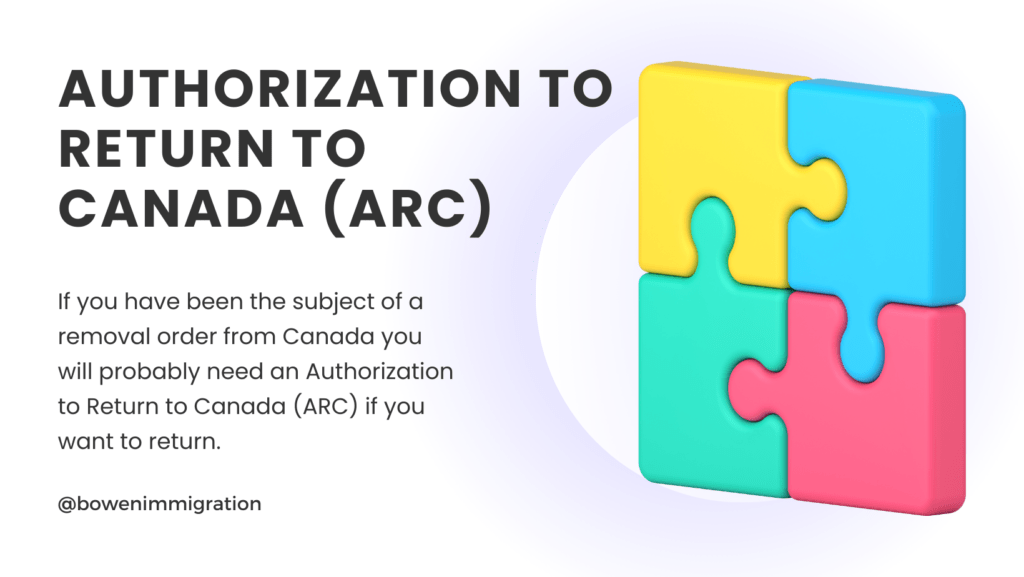Authorization to Return to Canada (ARC)
If you have been the subject of a removal order from Canada you will probably need an Authorization to Return to Canada (ARC) if you want to return. Whether you need one depends on the type of removal order that was issued.
⠀
Types of removal orders
There are three types of removal orders. Look at the document you received from Citizenship and Immigration Canada or the Canada Border Services Agency (CBSA) before you left Canada. The form number will tell you the type of removal order.
Departure Order (form number IMM 5238)
- If you get a Departure Order, you must leave Canada within 30 days and confirm your departure with the Canada Border Services Agency (CBSA) at your port of exit.
⠀ - As long as you do these simple steps and meet all the requirements when re-entering Canada, you will not need an ARC to return to Canada.
⠀ - If you leave Canada after 30 days and do not confirm your departure with CBSA, your Departure Order will automatically become a Deportation Order.
⠀ - To return to Canada in the future, you will have to obtain ARC.
Exclusion Order (form number IMM 1214B)
- If you get an Exclusion Order, you are forbidden to return to Canada for 1 year.
- If 12 months have passed since you left Canada and you have a Certificate of Departure (IMM 0056B) showing the date you left Canada, you do not need an ARC;
⠀ - If you want to return before the 12 months have passed, you must apply for an ARC;
⠀ - If an exclusion order was issued for misrepresentation, you are banned from returning to Canada for 5 years;
⠀ - If the CBSA paid for your removal from Canada, you must repay that cost.
⠀
Deportation Order (form number IMM 5238B)
- You are permanently banned from returning to Canada and can return only if you apply for an ARC;
⠀ - If the CBSA paid for your removal from Canada, you must also repay that cost before you are eligible to return.
Important to Consider
- Before applying for ARC, consider why you were issued an enforcement order, as well as your current situation.
For example, if you were deported because you were working illegally in Canada, are not currently employed, and cannot prove strong ties to your home country, the officer is unlikely to be satisfied that you would respect the terms and conditions of your stay in Canada. If the circumstances that led to the removal order being issued have not changed, it is less likely that you will be given permission to return.
💡Tips for Detention Reviews:
- If you are deported from Canada, it doesn’t mean you cannot return to Canada, so try not to stress out too much and contact our office for more information and further assistance.
💡Tips for Pre-Removal Risk Assessments (PRRA):
- It is a “second chance” to come back to normal life in Canada; under this program, you are being pardoned for being involved in criminal actions;
- The approval rate is based on how the individuals are vetted (screened);
- The life you lived in a certain period is important as well as your honesty;
- How well have you been able to rehabilitate yourself is crucial.
💡Tips for Appeals:
- Know your case very well, especially the main issue;
- Be aware of laws and regulations and be confident;
- Be ready to fight for your success in the case.
💡Tips for Refugee Claims:
- Claims can be made at the Canadian border;
- Claims can be made from outside Canada in refugee camp offices;
- Evidence is an important part in refugee cases, see examples below:
1. police/medical reports
2. testimonials
3. voice recording, text messages,
4. pictures, video recordings, etc.
Schedule a consultation today
We are ready to help you at any time convenient for you no matter where you are.
Your consultation will be held either online or in-person.
Due to the current COVID-19 pandemic, virtual meetings are preferred.
Got questions?
Check out our FAQs section to find out more about immigration to Canada.


